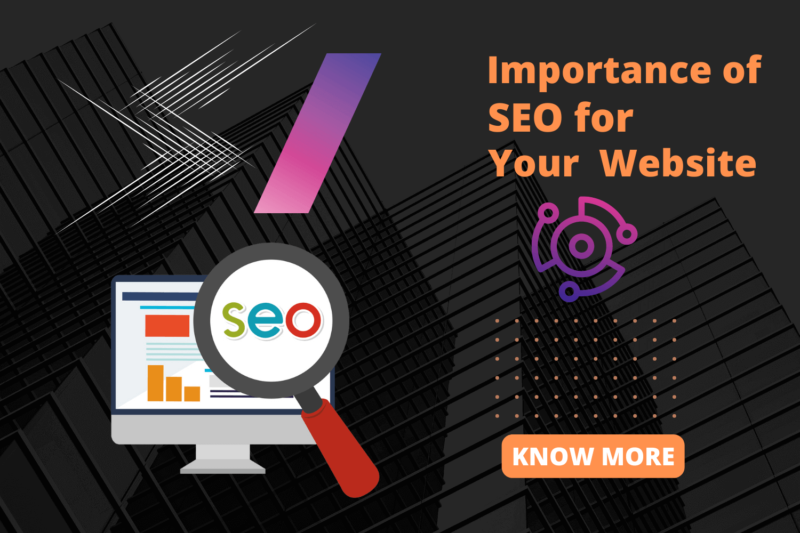Importance of SEO for Your Website
Search Engine Optimization (SEO) is the process of optimizing your website in a way that it ranks higher on search engine result pages (SERPs) for relevant keywords and phrases. SEO has become a vital aspect of digital marketing and website development, and its importance cannot be overstated. In this article, we will discuss the importance of SEO for your website.
- Increase website traffic
The primary objective of SEO is to rank higher on search engine result pages (SERPs). When your website ranks higher, it receives more clicks and subsequently, more traffic. By optimizing your website for search engines, you can attract a steady stream of organic traffic to your site, without having to pay for it.
- Improved user experience
Search engines like Google prioritize websites that offer a good user experience. A well-optimized website is easy to navigate, fast, and user-friendly. This leads to a positive user experience, which not only keeps users on your website longer, but also increases the likelihood of them returning.
- Increased brand credibility
Ranking high on search engine result pages increases the credibility of your website. Users are more likely to trust and click on websites that appear on the first page of Google than those on the second or third page. A well-optimized website conveys the message that your website is relevant, trustworthy, and authoritative.
- Better conversion rates
An optimized website is more likely to convert visitors into paying customers. When your website is well-structured, has good content, and is easy to navigate, it makes it easier for visitors to find what they are looking for. This increases the likelihood of them completing a desired action, such as making a purchase or filling out a contact form.
- Cost-effective marketing
SEO is a cost-effective way to market your website. Unlike traditional forms of advertising, such as TV or radio ads, SEO is a long-term investment. Once your website is optimized, it will continue to attract organic traffic for months or even years to come. This makes it a more cost-effective way to market your business in the long run.
- Compete with larger businesses
SEO offers smaller businesses the opportunity to compete with larger businesses. With the right SEO strategy, a smaller business can rank higher than a larger business on search engine result pages. This is because SEO is not just about the size of your business or your budget. It’s about the quality of your website and the relevance of your content.
- Stay ahead of the competition
With more and more businesses vying for online attention, SEO is essential for staying ahead of the competition. By optimizing your website for relevant keywords and phrases, you can ensure that your business is at the top of search engine result pages for those terms. This gives you a significant advantage over your competitors who are not utilizing SEO.
- Long-term benefits
SEO is a long-term strategy that offers long-term benefits. Unlike paid advertising, SEO is not a one-time expense that will disappear as soon as your budget runs out. By investing in SEO, you can enjoy the benefits of increased organic traffic and higher search engine rankings for months or even years to come.
- Measurable results
One of the greatest benefits of SEO is that it provides measurable results. By using tools such as Google Analytics, you can track your website’s traffic, rankings, and conversion rates. This allows you to see the direct impact of your SEO efforts and make informed decisions on how to optimize your website further.
- Mobile optimization
In today’s mobile-driven world, having a mobile-friendly website is crucial. Google has even implemented mobile-first indexing, which means that the mobile version of your website is now the primary version used for indexing and ranking. By optimizing your website for mobile devices, you can ensure that it is user-friendly and accessible on all devices, which can further improve your search engine rankings.
- Local SEO
For businesses that rely on local customers, local SEO is a critical component of their marketing strategy. Local SEO is the process of optimizing your website for location-based searches, such as “restaurants near me” or “plumbers in Boston.” By optimizing your website for local search terms, you can attract more local customers to your business and increase your visibility in your community.
- Adapt to algorithm updates
Search engine algorithms are constantly evolving, which means that SEO strategies must also adapt to stay effective. By staying up-to-date with the latest algorithm updates, you can ensure that your website remains optimized and continues to rank high on search engine result pages.
SEO is essential for any website that wants to attract organic traffic and increase brand credibility. It not only helps to increase website traffic, but it also improves user experience, increases brand credibility, leads to better conversion rates, and is a cost-effective way to market your website. By investing in SEO, you can take your website to the next level and compete with larger businesses in your industry.
How to Rank a website by using SEO
Ranking a website on the first page of search engine result pages (SERPs) can be a challenging task, but it is essential for attracting organic traffic and growing your online business. Search engine optimization (SEO) is the process of optimizing your website to rank higher on search engine result pages for relevant keywords and phrases. In this article, we will discuss some key strategies for ranking a website using SEO.
- Keyword research
Keyword research is the foundation of any successful SEO strategy. It involves identifying relevant keywords and phrases that your target audience is searching for online. By incorporating these keywords into your website content, you can increase your chances of ranking higher on search engine result pages for those terms.
- On-page optimization
On-page optimization refers to the elements on your website that you can control, such as your website content, meta tags, and images. By optimizing these elements for relevant keywords and phrases, you can improve your website’s relevance and authority, which can lead to higher search engine rankings.
- Content creation
Creating high-quality, informative, and engaging content is a crucial aspect of SEO. By creating content that is relevant to your target audience, you can establish your website as an authority in your industry, which can lead to higher search engine rankings. It’s essential to include your target keywords in your content and to create content that is optimized for both search engines and users.
- Link building
Link building is the process of acquiring high-quality links from other websites to your own website. Backlinks from authoritative and relevant websites can improve your website’s credibility and authority, which can lead to higher search engine rankings. It’s essential to focus on quality over quantity when it comes to link building, as low-quality or irrelevant links can harm your website’s search engine rankings.
- Mobile optimization
With more and more users accessing the internet from mobile devices, mobile optimization has become a crucial aspect of SEO. Google now prioritizes mobile-friendly websites in its search engine rankings, so it’s essential to ensure that your website is mobile-friendly and user-friendly on all devices.
- Local SEO
For businesses that rely on local customers, local SEO is a critical component of their marketing strategy. Local SEO involves optimizing your website for location-based search terms, such as “plumbers in Boston” or “restaurants near me.” By optimizing your website for local search terms, you can attract more local customers to your business and increase your visibility in your community.
In conclusion, Ranking a website using SEO requires a comprehensive strategy that involves keyword research, on-page optimization, content creation, link building, mobile optimization, and local SEO. By incorporating these strategies into your SEO strategy, you can increase your website’s visibility, attract more organic traffic, and grow your online business. Remember to be patient and persistent, as SEO is a long-term strategy that requires ongoing optimization and refinement to achieve and maintain high search engine rankings.



